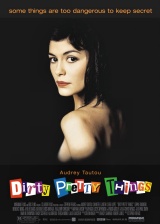 Audrey Tautou is the star attraction on the poster for Dirty Pretty Things. |
Profile and Interview:
Audrey Tautou
by Carlo Cavagna
|
by Carlo Cavagna
|
||
![]() udrey
Tautou has come to Hollywood. Except, it's not really Hollywood, it's Pasadena.
And, it's not to make a movie, it's just to promote a movie. And she's only
here for one day.
udrey
Tautou has come to Hollywood. Except, it's not really Hollywood, it's Pasadena.
And, it's not to make a movie, it's just to promote a movie. And she's only
here for one day.
There have been few star-making non-English language roles in movie history like the one Tautou enjoyed in Amélie. Right around Oscar time, in the winter of 2002, the twenty-three year old (now twenty-five) came out of nowhere to become a sensation in the United States and around the world. Though she didn't quite reach the level of commemorative plastic cups at Burger King, Tautou's huge mischievous eyes, bizarre bob haircut, and impish grin were everywhere as Amélie became the highest-grossing French-language film ever released in the United States, earning over $33 million through June 2002, according to the IMDB. The beguiling Tautou was the perfect Amélie, a shy but playful Montmartre waitress who secretly begins fixing the lives of the people around her. The trouble was, to most audiences, Audrey Tautou and Amélie Poulain became one and the same. What would Tautou do next?
Actors can become stars in their own backyards without working in Hollywood, but to become a bankable, recognizable international star on every continent, eventually they must come to Hollywood, and they must work in English. Chow Yun-Fat has done it. Monica Bellucci has done it. Jackie Chan, Juliette Binoche, Penélope Cruz, Franka Potente, and Jet Li have all done it. Even Takeshi Kitano came to Hollywood (Brother), albeit not very successfully. Hollywood films get a lot of bad press as a vehicle for artists to express themselves, but as Moritz Bliebtreu (Run Lola Run, Das Experiment) told AboutFilm.Com last year, "Hollywood is the place where the best people in the world get together and do movies." (Read interview.)
With the dramatic thriller Dirty Pretty Things Tautou has not come to Hollywood but has acceded to working in English and in London. She is clear, however, that it's not because of any interest in stardom. She just wanted to work with director Stephen Frears, famous for My Beautiful Laundrette, Dangerous Liaisons, The Grifters, and High Fidelity. It's a good thing Frears hadn't yet seen Amélie when he cast Tautou, because he might never have chosen her. Her character in Dirty Pretty Things, a world-weary and worn down Turkish immigrant named Senay, is completely the opposite of Amélie. Tautou has been compared to Audrey Hepburn and Leslie Caron, but little of that glamour is in evidence in this movie. When her character in the film speaks, it's not in the strongly French-accented English Tautou uses in her interview; it's in Turkish-accented English. It's difficult to comprehend how Tautou was able to pull off the language alone. Overall, her performance is an astonishing transformation that should open up a world of new acting possibilities.
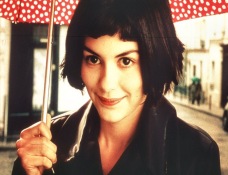 Audrey Tautou as Amélie. |
Born August 9, 1978, in Beaumont, France, and raised in rural Montluçon, Tautou has come a long way in a few short years. Fascinated by monkeys, she wanted to be a primatologist when she was younger, but quickly found her calling as an actor. In 1999, she participated in a Star Search-like competition sponsored by Canal Plus called "Jeunes Premier" (The Young First) and won Best Young Comedienne at the 9th Béziers Festival of Young Comedians. Her reward was to be selected by director Tonie Marshall for a supporting part as a beautician in Venus Beauty Institute, even though she got lost in Paris and arrived nearly an hour late for her audition. Acting alongside Nathalie Baye (Day for Night, The Return of Martin Guerre), Tautou won another award—the Cesar (like a French Oscar) for Most Promising Female Newcomer. Even before the award, her beguiling eyes had caught the attention of director Jean-Pierre Jeunet. Seeking a replacement for Emily Watson, who had dropped out of Amélie, he saw Tautou in the Venus Beauty Institute poster and immediately cast her. On the heels of Amélie's success, Tautou starred in three French comedies—He Loves Me…He Loves Me Not, God Is Great, I'm Not, and L'Auberge Espagnole—before trying her hand at an English-language role. Now she's trying her hand at English-language interviews. Though she's done them before, she hasn't done them often. The self-effacing Tautou refused to do publicity to campaign for an Oscar nomination for Amélie, for example, and she didn't get one. She walks into the interview room wearing jeans and a deep green velvet blazer not buttoned but tied in the front with a sea-green kerchief. Without the layered bob (her shortish hair is held back with nearly invisible hair pins), she doesn't look much like Amélie, but those bottomless brown eyes, so deep you can't discern where the pupil ends and the iris begins, are unmistakable. Though Tautou lacks confidence in her English, she rarely needs to consult her interpreter, and it's unnecessary in the few instances she does so—"delegé" to "delegated" is not that big a leap—and that uniquely French expression articulated by exhaling loudly and shrugging slightly (pronounced kind of like "peeufff") needs no translation.
During the interview, she seems unsure of her future and even of her talent, but one thing seems certain. Even though she is continuing to find ways to work with big names—her next project is another French-language Jeunet film with Jodie Foster called A Very Long Engagement—we should not expect Tautou working in Hollywood anytime soon. She appears to be heeding Jeunet's advice to stay away, based on his bad experiences on Alien: Resurrection. "Jean-Pierre told me about his adventures in Los Angeles," she told E! a year ago, and the IMDB quotes her as having said, "I certainly don't want to be in Thingy Blah Blah 3, if you know what I mean." She doesn't rule Hollywood out, however, if the director and the project are right. She has had plenty of offers, just not the right one yet.
[Read the AboutFilm review of Dirty Pretty Things]
Question: How do you like being in L.A.? Do you know Hollywood?
Tautou: I don't really know Hollywood, and I think that L.A. needs a bit of time to really know the city, because it's such a huge city. As I'm working, I don't have much time to discover the city.
Question: You've been to the U.S. before, though, right?
Tautou: Yes, only New York. I don't know any other town, and the only other one I went to is L.A.
Question: Can I ask about your ethnic background, other than French? Do you have any Turkish in you?
Tautou: No, no. Very often I have been asked if I have some foreign origin, like from Asia, or from North Africa, or from Spain. I mean, as far as I know, eh? I don't know where my grand-grand mother was from.
AboutFilm Question: Tell us about creating a Turkish accent in English, when you already speak English with a French accent.
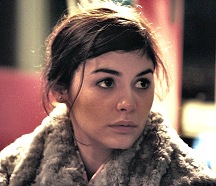 Audrey Tautou in Dirty Pretty Things. |
Tautou: For me, it was a really, really huge amount of work because my English was not good, and I didn't have time really to learn English, so I had to start right into the Turkish accent. I had a wonderful dialect coach called Penny Dyer. And we went to meet some Turkish women, and she was recording all our conversations, so my ear got used to this melody, the way of talking. After we [worked] on the text, but before that she had taken out all the words in the script, one by one, and make some lists, depending on the vowels and the sounds they had in it. So I spent a lot of time saying all the lists with her correcting me, to obtain a kind of spontaneity to say it. We had associated a color for every vowel. So after on my script I colored all the syllable, so when I was reading the sentence, it could remind me immediately which sound it was. After we did the work on the lines, the stress, which word was important for the meaning, depending on which intention I wanted to give. So, that was very, very hard work.
AboutFilm Question: How much time do you think you spent on that kind of preparation?
Tautou: I worked all along the shooting. I prepared the movie almost three weeks, because I didn't have a lot of time. After we were rehearsing just the scene which was coming next on the schedule. So each morning, I was working half an hour before the day start. So, I don't know, the hours—I have no idea.
Question: What do you think of Stephen Frears, as a director? I'm sure you had a bunch of movie offers in Hollywood. What do—
Tautou: I wanted to work with Stephen Frears because I admire his work. He's such a clever man.
Question: But you did turn down a lot of romantic comedies that American directors offered you, right?
Tautou: Yeah, I had some little offers, but you need to be brave. For me, when you don't speak English, you need to be brave to do a movie in English, because you think, "Why am I going to do a movie in a foreign language? I'm going to be—suck. Where is the interest?" So the interest by doing such a thing is when you can discover an amazing talented director. Or an amazing story. But me, to be a bit confident, or think that what I will do will be okay, it was necessary that I work with someone much cleverer and talented than me.
Question: Amélie was so successful here in the States and worldwide. Are you purposefully looking for roles that are different, especially since you became known as Amélie?
Tautou: The thing is, I spent almost six months on the shooting of Amélie playing this character. So after, it's almost a selfish way of behaving. I want to do some things different. I don't want to avoid comedy or romantic stories because I did Amélie, so [I think] if I do another one, it's going to bad. I'm not planning my character like, I do something funny, and something sad, and something funny, and something sad, you know? I didn't choose [Dirty Pretty Things] because it was a dark movie and the character was very different. Of course, it attract me more because it was something new, but I'm sure that if had been another project with the same director, I would have done it with the same pleasure.
Question: So what did you enjoy most about working with Frears? What did you take away from the experience?
Tautou: I don't know, I like everything, you know. The shooting and the atmosphere and everything was really great. It's very enriching when it's somebody who is so clever, so brilliant. And all the actors—it was great, too, because the casting was very unusual, so international. I wasn't the only one who didn't speak English, you know. Sergi López was worse than me!
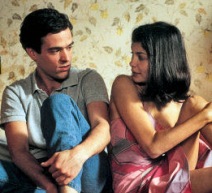 Audrey Tautou with Romain Duris in L'Auberge Espagnole (2002) . |
Question: There's an urban legend about a guy who is drugged and wakes up in a hotel room with his kidney having been removed. Had ever heard of that before making this movie?
Tautou: No, but…the writer…had read in the newspaper that a guy working in a hotel had found a human heart in a toilet. It was like three lines, and he said, "Oh my god."
Question: Do you have nightmares when you have to play such a part?
Tautou: No. Because what happens in this movie is the reality. Of course we don't see it, because we can't see it, that's another world. But if you have a nightmare for all the things that are terrible in this world, you wouldn't sleep.
Question: The movie deals with survival. In order to survive day to day, do you think it's necessary to compromise high-mindedness, or your own sense of morality? Many of the characters do have to sacrifice things that they believe in.
Tautou: I think these persons, they are forced to do these things. They don't have the choice... I think it's very hard to understand what they are feeling, of course, because it's completely foreign for us. But when you don't have any identity, any money, any passport, any work, you are nothing. There's many people who sleep on sidewalks and in their countries they were doctors, lawyers. This is very common. There's an actress in this movie who played a little part, and she came from Senegal or Somalia, I don't remember, but she came to London twenty years ago, and before she was an actress in her country. And she had to move. So she hadn't acted for twenty years. She [became] like a cleaning lady.
Question: Do you think illegal immigrants are a subject that we need to talk about more?
Tautou: Yes, of course, I think [that]. Yeah, yeah, yeah. I think that that's why this movie also is interesting. But after that, I'm not a political person.
Question: Can you talk a little more about how Stephen actually works? Is he pretty rigid as a director, or does he give you leeway? Are you able to improvise?
Tautou: Me, I couldn't improvise, because each word was so— I couldn't. If they wanted to change a sentence, they had to tell me, like, two days before just so I can learn it and practice it. But, Stephen is very protective. He was very protective with me, very fatherly. He gives a lot of freedom to the actor, but in another way, he maintains you on the right road. You have the feeling when you are working with him that you are a bit the king of the set. You can choose everything you are, you are free to take all the decisions you want. He trusts you. He delegates. He gives you the responsibility of your character, but you know that he's always there to help you, even if it's not by saying, "Oh, do it more like that, or do it more like that." Once he came after a take and he told me—it was at the beginning—he came and he said, "So, how were you?" "I don't know. It's not me who can say that. You tell me if you are happy." "Oh, no, no, me, I can't know. So you tell me. You. Do you think you were good, or not?" I said, "But I can't say that." And he said, "Yeah, you know it. Because you can feel it if you are sincere or not. But me, on my little monitor, I can't see it."
Question: You mentioned hanging out with the Turkish women. What was that like? Were you actually having some fun? You clearly worked very hard on this movie, but was the experience also fun?
Tautou: Oh yes, that was great, because they were very generous and attentive. I had asked them to read the script to be sure that everything was right, that they thought that it was believable. I went to see them many times. We had breakfast. Usually I was coming early in the morning, because the café wasn't too crowded. They talked about their experiences. It was very enriching.
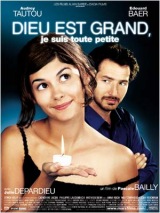 Still looking like Amélie in her first post-Amélie role: Audrey Tautou on the poster for God Is Great...I'm Not (2001). |
Question: Have you traveled to Turkey?
Tautou: No. That's the only thing I would have done if I had had more time. Yeah, I think that it's a lack in the preparation for my part.
Question: How do you prepare for a character?
Tautou: In general? Usually, I read the script very often. I think that everything is hiding in the script. After, I try to get some information documents about the character, as much as I can know about her. After, I can imagine whatever I want.
Question: What do you mean by documents, I'm sorry?
Tautou: I mean like, different from the character. For Dirty Pretty Things, I was a Turkish refugee, so I had to understand a bit more what was to be Muslim, to be an immigrant, to be a woman, what they were feeling. When I did He Loves Me, He Loves Me Not, I read the book.
Question: What's your reaction to the artwork, the poster? It's you, but it doesn't really tell the story of the movie.
Tautou: Yeah, exactly. I don't know the culture here, so I don't know if it's a good poster in this country, or not. But that's true that when I saw it I was a bit surprised. I don't want to take any responsibility here, because I don't know, I'm not a publicist. I don't know what works. But that's true, that's not the movie, not really. The only thing which I would say is right is the black visual, and the kind of funny way that the title is written. Because in the movie, [which is] a thriller, there's very dark and terrible things, but in another way there's still some funny and nice things.
Question: It was probably done that way because you're the most known actor in the movie, and that also happened with L'Auberge Espagnole, where you were billed so high even though you had a small part in the movie. How do you feel about it? Do you feel that it takes away from the people that you're working with at all?
Tautou: Oh, no. Because there's no question of pride—I mean, personally, I think. [pauses] I don't want to worry about that, at least in this country.
Question: Do you have a goal in your life, in your career? Do you think about the future?
Tautou: Oh no. And I don't know where I'm going to be in three years. Because I have the feeling that the future is so full of possibilities, to stop being an actress, to do something else… for me, the future is just a huge bunch of discoveries. So after, you have to choose the direction you want to go. The only thing is, I really want to get enriched every time.
|
Stephen Frears on Audrey Tautou Question: Last week some of us spoke with Audrey Tautou about doing a Turkish accent in English when she speaks English with a thick French accent, and the amount of work she had to do, and how line changes had to be submitted two days in advance. Frears: Well, it wasn't quite as formal as that. I mean, yes, you had to be very attentive. Question: Did you anticipate that problem when you cast her? Frears: Well, the truth is the three of them [Audrey Tautou, Chiwetel Ejiofor, Sergi López] don't speak English as their first language. I mean, compared with Sergi López, she is bilingual. He speaks no English. Question: But she had to speak English like she was from someplace else. Frears: Yes, I thought that made it actually easier for her, because she had something to go to, whereas if she had been playing a French girl speaking English, she wouldn't quite know where she ended and the character began. So, with a Turkish accent it was a goal to head for. But I had a very good voice coach [Penny Dyer], and you schedule it to take that into account. You realize that you can't make things up on the day, because language is going to be a serious problem. But it's true that afterwards, I couldn't believe what I had done. I just thought I must have been drunk. I mean, I think the three of them are triumphant, so we got away with it. But I can't think why I was allowed to do it, or why I agreed to do it. I must have been insane. Question: The language—everyone struggling to speak the same language—is part of what gives the film its strange quality. Frears: Yes. In other words, you couldn't have done it any other way. But it was a huge problem to be solved. I mean, I knew I didn't want to cast— For example, it might [have been] foreign people living in England. I didn't want to do anything like that. It had to have the quality you're talking about. |
Question: You seem very cautious about the movies you want to do? Why?
Tautou: Because I don't want to think my life as a career. I'm interested in this work only because of the meaning I can make. After each experience, you grow up, you get enriched with something, and you don't know how you're going to be in six months, you don't know what you're going to want, what you're going to need.
Question: Most of the American actresses think that by thirty or thirty-five their careers are over. You don't think that soon you're going to be—
Tautou: [shocked] Soon? Even if I have only ten more years in front of me, it's such an intensive life. I have the feeling that I have already lived three lives in three years. I'm not frightened. No, I'm not frightened.
Question: In Paris a few years ago there were two great French actresses, Juliette Binoche, who ended up on Broadway, and Sophie Marceau, who ended being a James Bond girl. What would you choose? What will be your next step in the U.S.?
Tautou: I think it will be my own.
Question: You must have some ideas.
Tautou: No, not at all. I'm not sure that I would be brave enough to be on stage in English, because I haven't done [that] even in France yet. And I don't think that— Today, I'm not imagining me being the James Bond girl, because anyway I don't have the good maturation. [laughter]
Question: You don't see yourself on the stage in Paris?
Tautou: Yes, but now, I wouldn't feel brave enough, but I don't know in six months.
Question: Is it important for you to have a career in America? Is that something you concentrate on, or are you more worried about staying in France?
Tautou: Um.. I don't want to stay in France, [but] it's not important for me to do a career here. I know that's a boring answer, but that's the truth. I just want to continue to meet— There's many directors here, in France, in Spain, in England, that I like [and] admire. And of course if they wanted me to be in their project, I would love it, and I would go. If it's a small budget or big, I don't care. But now, first, I'm not a psychic, so I have no idea, and second, I'm very superstitious, so I think that things that have to happen, happen.
Question: It sounds like you're saying that it's more important for you to work with certain people than being a star.
Tautou: Yes.
Question: So outside of acting, can you name something today, that you feel very passionate about?
Tautou: I would say, traveling. I really like to discover a new culture, a new country, a new rhythm of living. I really, really like that. I think that's the most enriching thing, for my nature, because I like the psychology of people.
Question: Would you be an anthropologist then, if you weren't acting? What would you being doing?
Tautou: You know I've never thought about that, but it's true, I'm very interested in people, in general.
Question: Since you do all this traveling, where has been the weirdest place you've been where someone screamed, "Amélie!"
Tautou: Hmm… you know, I'm not surprised now when they recognize me anywhere.
Question: Does the press respect your privacy in France?
Tautou: Yeah, because in France we have a law which doesn't allow the press to publish a photo that you didn't approve. It lets the paparazzi take the picture, but if they publish this picture, you have the choice to sue the newspaper. So me, I always sued them.
Question: You said earlier that you had gotten some offers for American films. Did you get a lot of offers, or just a couple? Why weren't you interested?
Tautou: You know, I said earlier that it's— I don't want— I have objectives of talents [rather] than of power, or of money.
Question: So did you just not like the films that they gave you? You didn't like the scripts?
Tautou: Yeah, um, I don't know. I just didn't feel, you know, brave enough. After Amélie was such a huge success that, strangely, I didn't want to do a movie which could be a huge success. I wanted to go and to do something smaller and more discreet. So that's why I chose to do the first movie in France [and] not be in the spiral of success, you know. I had given so many interviews, you know.
Question: Money doesn't attract you?
Tautou: No. I mean, you don't need to earn twenty million dollars. But, I think that if you do an American movie it's important to earn some money, but in a stupid way, to be respected.
Question: You want to be proud of what you're doing?
Tautou: Yeah. Yeah.
Feature and Interview ©
August 2003 by AboutFilm.Com and the author.
Images © 2002 and 2003 by var. copyright holders. All Rights Reserved.
| Related Materials: | ||
| |
||
| |
||
| |
||
| |